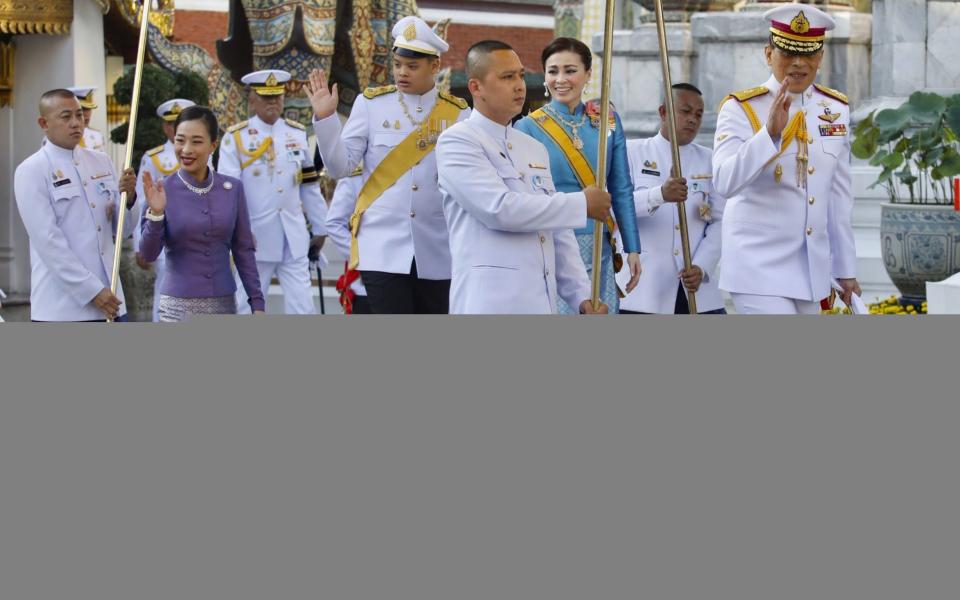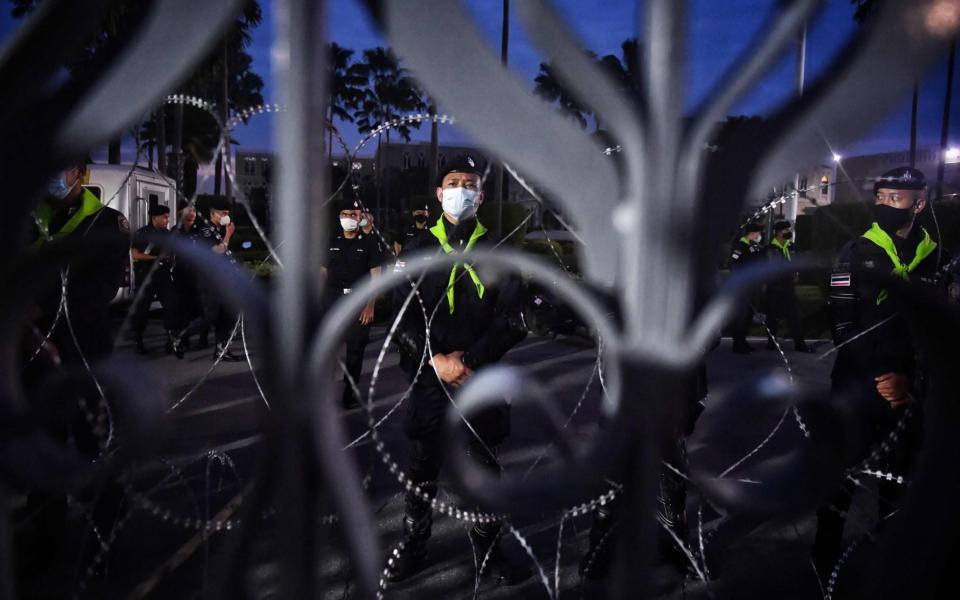Thailand protests: Government declares state of emergency after demonstrators confront royal family

Tensions are rising in Thailand after police in riot gear forcefully cleared protesters from the grounds of the prime minister’s offices in Bangkok in the early hours of Thursday within 30 minutes of the government declaring a state of emergency to quell pro-democracy rallies.
Following a mass rally of thousands of activists in the capital on Wednesday to demand Prime Minister Prayuth Chan-ocha’s resignation and the reform of the monarchy, a new emergency decree has banned gatherings of more than four and outlawed online posts deemed to be a national security threat.
However, protesters – most of them students – have vowed to defy the rules and regroup on Thursday afternoon at the Rajprasong intersection in the heart of a major shopping district.
Calls to continue demonstrating came despite the arrests of high-profile protest leaders, including human rights lawyer Anon Nampa and Parit “Penguin” Chirawat, who have both been vocal in the criticism of the country’s revered monarchy and been detained before.

Police said they had arrested about 20 people who refused to cooperate with their clearance measures.
The anti-establishment Khana Ratsadorn group condemned the state of emergency and the removal of protesters. Student activist Panusaya “Rung” Sitthijirawattanakul read out the group’s position in a Facebook post shortly before she was also taken into police custody, reported Thai PBS World.
She said protesters would go ahead with their planned event on Thursday, but police spokesman Kissana Phathanacharoen told reporters the rally was banned under the new measures.
Meanwhile, Thanathorn Juangroonruangkit, founder of the Future Forward political party which was hugely popular with first-time voters during last year’s general election, claimed that the anti-government protest had been peaceful and denounced the state of emergency.
“There is no legitimacy for the state of emergency and for the dispersal of the rally,” he said.
To justify the decree that includes a ban on gatherings of five or more people, and on news or online content that “could create fear or intentionally distort information”, the government cited the obstruction of a royal motorcade as well as growing disorder, economic damage and the pandemic.

The pro-democracy movement - which has drawn thousands to the streets over the past three months to oust the prime minister, demand an end to the harassment of government critics and bring the monarchy under the national constitution - has been peaceful so far.
However, Wednesday’s mass protest of tens of thousands marked a watershed moment after demonstrators, held back by ranks of police officers, confronted the royal motorcade carrying King Maha Vajiralongkorn during a procession through Bangkok.
Activists yelled “my taxes” referring to contributions to the royal court’s coffers, and made three-fingered salutes – a symbol of defiance borrowed from the popular Hunger Games books and films – as Queen Suthida stared out from the limousine window.
Such overt challenges to the monarchy are unprecedented in Thailand, where the royal family is still deified and protected by strict lese majeste laws that carry prison sentences of up to 15 years. The government have branded the demands for reform as "unconstitutional”.
Calls to curb the King’s powers have prompted a backlash from Thailand’s staunchly pro-monarchy establishment and there were volatile scenes on Wednesday as the police tried to separate protesters from large groups of royalists, dressed in yellow as a sign of their devotion to the institution.

Government spokesman Anucha Burapachaisri said the prime minister had ordered police to press charges against "the protesters who obstructed the royal motorcade" on Wednesday.
Charges will also be pursued against "those who had acted in a way that defames the monarchy", he said in a statement.
Speculation is rising that the government’s sudden show of force may also be linked to a visit to Bangkok on Thursday by Wang Yi, the Chinese foreign minister.
Mr Wang will meet Prime Minister Prayuth to discuss strengthening ties at Government House, the scene of Wednesday night’s sit-in protest.
The introduction of emergency national security measures and the targeting of individual protest leaders recalls tactics used by the Beijing and Hong Kong authorities to crush a wave of dissent in the Chinese-ruled city.
Thai protesters have pledged to continue their efforts, however.
"The new constitution must bring Thailand to a democratic system with the monarchy institution truly governed under it," said Tattep Ruangprapaikitseree, one of the protest organisers.
Wednesday's demonstration was intended to commemorate the 47th anniversary of a 1973 student uprising that saw 77 people killed.
"This could be the last fight for Thailand's democracy," Attaporn, 18, who travelled from the kingdom's northern Pichit province to join the rally, told Reuters. "I have to do this if I want a better future."

 Yahoo News
Yahoo News 
